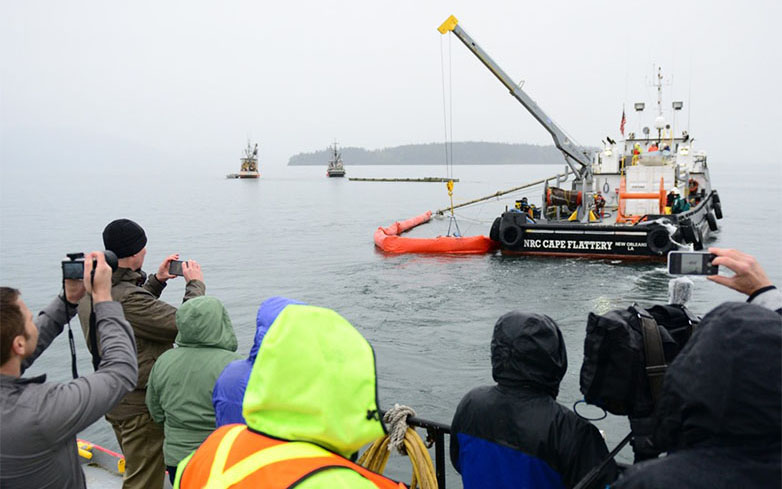Preparing for oil and hazardous materials spills
Preparedness means taking steps before an oil spill occurs to reduce impacts to people, the environment, and the state's economy. Washington has decades of experience in maintaining the highest regulatory standards for oil spill planning. In Washington, the oil spill community — which includes Tribes; industry; and local, state, and federal agencies — maintains oil spill plans to ensure a level of preparedness in the region.
We review and approve industry oil spill plans, provide technical assistance, and test the efficacy of plans through oil spill drills. We have also established a financial responsibility program to ensure the state’s largest potential oil spillers have the resources to pay the costs of oil spill cleanup and damages. Learn more at the financial responsibility webpage, located here: Financial responsibility.
We require industry to practice their oil spill contingency plans with equipment deployment drills.
Oil spill preparation involves a continuous cycle of activities that capture lessons learned from spills and drills to improve oil spill contingency plans. In the Pacific Northwest, oil spill planning is part of a three-state effort to manage oil and hazardous material spills in a coordinated manner. The Northwest Area Committee has developed policies and tools for use by the oil spill community.
Our preparedness work
In planning for spills, we:
- Approve oil spill contingency plans, which includes planning requirements for facilities, pipelines, railroads, and commercial vessels.
- Approve primary response contractors, which are private companies or cooperatives under contract with plan holders for response equipment and personnel support.
- Approve spill management teams, which are personnel trained to integrate into an incident command system or unified command system and manage an oil spill.
- Approve wildlife response service providers, which are companies with trained personnel who are qualified to staff and manage wildlife response activities during an oil spill.
- Provide contingency planning guidance for railroads, pipelines, commercial vessels, refineries and oil terminals.
- Develop geographic response plans for use in response to oil spills to water.
- Participate in the development of the Northwest Area Contingency Plan.
- Manage the registration system for volunteers and Vessels of Opportunity.
In training and when practicing test plans, we:
- Evaluate oil spill drills that test and improve preparedness plans, equipment, and procedures.
- Train on Incident Command System roles and responsibilities.
- Verify response equipment and ensure it is properly maintained.
In researching effective response technology, we:
- Review research and development of oil spill response technologies, training procedures, and operational methods.
- Develop and test response tools to ensure rapid, aggressive, and well-coordinated spill responses.
In ensuring oil spillers can pay for a spill, we:
- Require proof that commercial vessels have up to $1 billion of insurance or other proof of financial responsibility.
- Require proof that large oil handling facilities, such as refineries, pipelines, and marine terminals have up to $300 million of insurance or other proof of financial responsibility.
Rules directing our preparedness work
Related links
Contact information
Matt Bissell
Preparedness Section Manager
Matt.Bissell@ecy.wa.gov
360-280-7061


